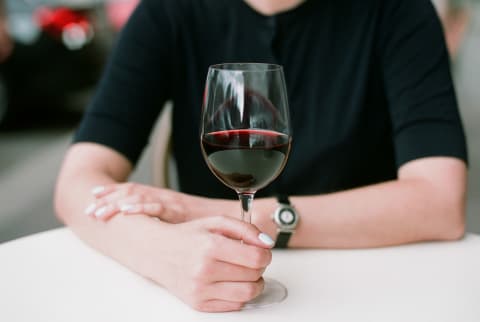Advertisement
Two Ways To Get More Resveratrol Without Drinking Red Wine


Let's start by saying this: Red wine is not a health food. It's a type of alcohol. Where it gets convoluted is that the beverage does contain beneficial plant compounds called polyphenols, including resveratrol. Once an unrecognizable name, resveratrol has become ubiquitous with longevity.
Studies show that resveratrol is a powerful antioxidant that helps combat oxidative stress, regulates and protects mitochondrial health, supports healthy blood flow (vital for the heart and brain), and protects cognitive function1.*
It's definitely a compound we want to get more of to promote optimal health. While occasionally drinking some red wine can fit into an overall healthy dietary pattern, it shouldn't be your go-to source of the compound. Here's why and other ways to get resveratrol daily.
Red wine and resveratrol
So, red wine is the most consumed dietary source of resveratrol and one of the highest sources of the antioxidant2. Sigh. How is that even possible? Well, resveratrol is particularly concentrated in the skin of red and black grapes (there's some in green grapes, just not as much).
Red wine is fermented with the skin on. Not only does that retain the fruit's resveratrol content, but the fermentation process even further preserves and concentrates the antioxidant into a few ounces of liquid.
Some studies have shown a benefit of moderate wine consumption (about a glass a day) with brain health and longevity benefits3—with resveratrol often cited as a contributing factor. But, the majority of research shows excessive alcohol intake ages the brain4 and body faster, making you more susceptible to long-term health struggles5.
So, it's best to prioritize other resveratrol-containing foods.
Foods with resveratrol
The one food that rivals the resveratrol in a glass of red wine is, surprisingly, mulberries.
One cup of fresh mulberries can provide up to 7.1 milligrams6 of resveratrol—whereas many wines typically range from 0.5 to 2 milligrams7.
Other foods with resveratrol include:
- Purple and black grapes8 (0.1 milligram)
- Green grapes8 (0.05 milligram)
- Boiled peanuts9 (0.9 milligram)
- Peanut butter9 (0.03 milligram)
- Semi-sweet chocolate10 (0.34 milligram)
- Cocoa powder10 (0.02 milligram)
These foods also supply a slew of other polyphenols, vitamins, minerals, and even fiber, making them a healthy choice for daily consumption. However, it's important to note that the brain health benefits of this compound are associated with getting at least 100-500 milligrams11 of resveratrol daily. And that's where supplements come in.
Try supplementing with resveratrol
Results of a yearlong clinical study (published in Nutrients in 2020) found that daily resveratrol supplementation significantly improved overall cognitive performance13 in women ages 45 to 85.*
A two-year clinical study found that supplemental resveratrol enhanced cognition14 and blood flow to the brain in postmenopausal women.
And a systematic review and meta-analysis of resveratrol clinical studies found that regular supplementation improved some measures of cognitive performance.
A high-quality resveratrol supplement is the way to go if you're looking to capture the antioxidants' full cognitive longevity effects.
You can find supplements that just provide resveratrol (we list some of our favorites here) or with other brain-supporting nutrients.
In mindbodygreen's brain guard+, we combined a clinically backed dose of readily absorbable resveratrol (as Veri-Te™) with two other neuronutrients: citicoline and kanna. Citicoline has been clinically shown to support memory and brain health15 over time. And kanna is known for its calming mood support and its ability to promote a healthy stress response.
It's the perfect combination of ingredients to support cognitive longevity.*
The takeaway
Resveratrol is a powerful antioxidant that supports overall health—especially cognition.* Red wine is a known concentrated source of resveratrol, but it's not the best way to reap the benefits. Instead, opt for eating other resveratrol-containing foods and consider a high-quality resveratrol supplement (like brain guard+) to really capitalize on the brain health benefits.
15 Sources
- https://pubmed.ncbi.nlm.nih.gov/35187615/
- https://www.ncbi.nlm.nih.gov/pmc/articles/PMC4942868/
- https://www.ncbi.nlm.nih.gov/pmc/articles/PMC9824172/
- https://www.ncbi.nlm.nih.gov/pmc/articles/PMC7019227/
- https://pubmed.ncbi.nlm.nih.gov/37905315/#:~:text=Heavy%20drinking%20was%20also%20found,cancer%20risks%20compared%20to%20males.
- https://www.ncbi.nlm.nih.gov/pmc/articles/PMC4288802/
- https://www.sciencedirect.com/science/article/abs/pii/S0308814606001075
- https://www.sciencedirect.com/science/article/pii/S0026265X13002749#t0020
- https://pubmed.ncbi.nlm.nih.gov/10563995/
- https://pubmed.ncbi.nlm.nih.gov/18759443/
- https://www.ncbi.nlm.nih.gov/pmc/articles/PMC10815776/
- https://pubmed.ncbi.nlm.nih.gov/28054939/
- https://www.ncbi.nlm.nih.gov/pmc/articles/PMC7146200/
- https://pubmed.ncbi.nlm.nih.gov/32900519/
- https://www.ncbi.nlm.nih.gov/pmc/articles/PMC8349115/
